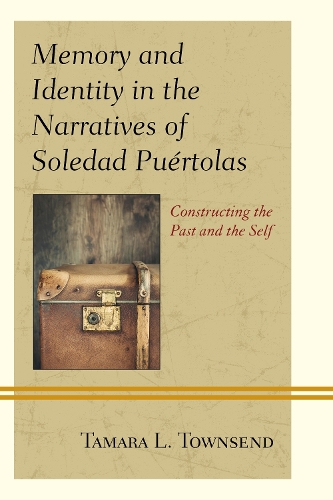
Memory and Identity in the Narratives of Soledad Purtolas: Constructing the Past and the Self
(Hardback)
Publishing Details
Memory and Identity in the Narratives of Soledad Purtolas: Constructing the Past and the Self
By (Author) Tamara L. Townsend
Bloomsbury Publishing PLC
Lexington Books
9th September 2014
United States
Classifications
Professional and Scholarly
Non Fiction
Gender studies: women and girls
863.64
Physical Properties
Hardback
162
Width 161mm, Height 236mm, Spine 17mm
386g
Description
Narratives of contemporary Spanish writer Soledad Purtolas (1947-), inducted into the Real Academia Espaola in 2010, depict the psychological struggles of the individual in postmodern democratic European society. Purtolass realist style emphasizes storytelling and character portrayal, and her urban middle-class characters seek satisfying interactions with others and a sense of purpose. Memory aids characters in their quest for meaning and identity, and their use of memory reveals their self-perception and outlook on life. This book maps four ways in which Purtolass narratives use memory to approach the fundamental problem of the individuals search for purpose and identity. Some characters are burdened by memory in certain texts, especially Das del Arenal (1992) and Burdeos (1986). Reflection upon a painful self-defining memory affects their present mood and behavior. For some, this burden causes them to withdraw or to act irresponsibly; others accept and overcome the scars of the past. A second type of character takes an escapist approach to memory, as seen in Queda la noche (1989). Their nostalgic retreat indicates a restless dissatisfaction with the present. In a third type of memory, a secondary character provides the organizing force behind a protagonists reminiscences, often an extroverted foil to highlight the protagonists introspective nature. Memory of the relationship motivates the protagonist to mentally order his or her own life through the life review process; Una vida inesperada (1997) and La seora Berg (1998) provide examples. Finally, in the amnesic mode, Purtolas departs from realism to experiment with different forms of amnesia, as in La rosa de plata (1999) and Si al atardecer llegara el mensajero (1995). Memory loss highlights the centrality of memory to personhood and identity, while at the same time it draws attention to the inadequacy of memory to explain the totality of existence.
Reviews
Thoroughly researched and beautifully written, Tamara Townsends study on the construction and reconstruction of memory illuminates a fundamental theme in the works of Soledad Purtolas. In an era in which Spanish society is deeply immersed in the understanding of its historical past, Townsends insightful approach to the works of Puertolas also introduces readers to Spains sense of collective memory and national identity. -- Katica Urbanc, Wagner College
Tamara Townsends exhaustively researched, elegantly written, and cogently argued Memory and Identity in the Narratives of Soledad Purtolas is a significant and welcome contribution to the study of this eminent Spanish writer, one of the few women ever elected to the Real Academia de la Lengua in its 300-year history. Two decades after the only book-length study on Purtolas published in the United States, Townsend effectively brings criticism on Purtolas into the twenty-first century, detecting parallels between Purtolass texts and the ongoing memory debate in post-Franco Spain. Townsend identifies memory as the recurring, unifying motif of Purtolass narratives, and explores the different roles it plays (baggage, escape, relational, amnesia) in the construction of the subject, and the relationship between the self and society. Well-organized and ambitious in scope with close reading and insightful analyses of several of Purtolass novels and short stories, Townsends book is a compelling and necessary read for all students of contemporary Spanish literature and history, philosophy, psychology, and memory studies. -- Francisca Gonzlez Arias, University of Massachusetts, Lowell
A fascinating study of memory in the narrative of Soledad Purtolas; Tamara Townsend explores the ideas of the Asociacin para la Recuperacin de la Memoria Histrica in relation to Purtolas' work, as well as the mysterious nature of memory in identity and how memory helps to navigate the murky river of life. -- Sandra J. Schumm, Baker University
Author Bio
Tamara L. Townsend is assistant professor of Spanish at Wheaton College.
